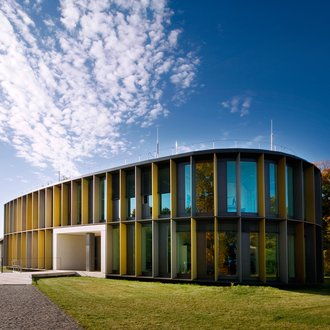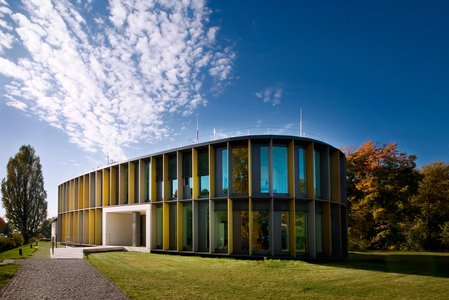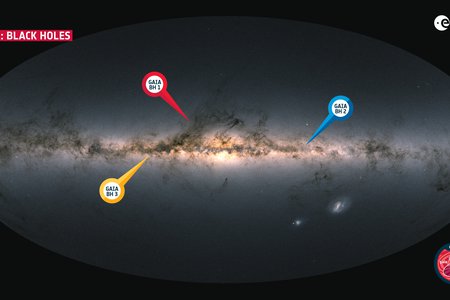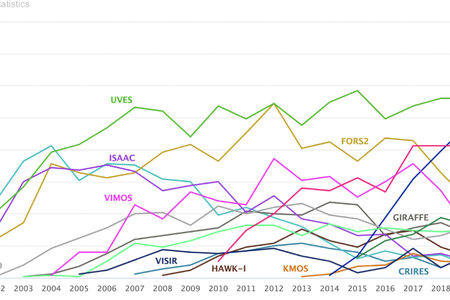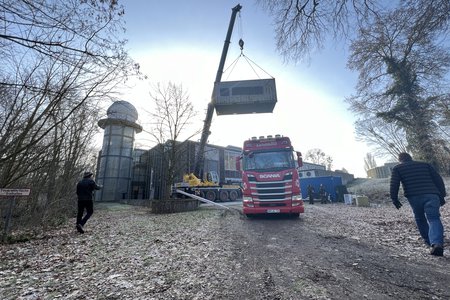Leibniz Institute for Astrophysics Potsdam (AIP) validated by excellent evaluation result
The Leibniz Institute for Astrophysics Potsdam (AIP) was given excellent marks in the independent evaluation process by the Leibniz Association, which takes place every seven years. The development of the institute over the past years was described to be extremely successful. AIP has taken important and clever strategic decisions in continually developing and extending its instrumentation and computer-aided infrastructure. The senate of the Leibniz Association has now confirmed the results of the evaluation, recommending continued funding by the federal government and the federal states.
One appraisal of the evaluation committee was that: “In terms of its expertise inastrophysics, AIP is firmly and broadly based. This is one of its great strengths that enables it to implement a comprehensive, cross-disciplinary research strategy. At the same time, AIP has defined appropriate crosscutting themes which allow it to set priorities. The institute is encouraged to continue this path in order to maintain and further develop its standing as an internationally competitive research institution.”
The review board valued AIP’s research and development programme as very good to excellent. Especially impressive to the committee was the broad network of the AIP on national and international scale and the institute’s success in taking part in big transnational research projects. The AIP is, for example, taking the lead in developing multi-object Spectrograph 4MOST, an instrument for an ESO telescope. Some individual research groups, for example, the “Milky Way and the Local Volume”, were noted to be one of the best in the world. The institute’s commitment in developing software for big instrumental projects like its involvement in the 2nd generation VLT instrument MUSE, was also positively noted by the review board. The AIP is becoming known as a worldwide leader for 3D optical spectroscopy.
To illustrate the above statement, the AIP is already involved in upcoming projects: The group “High-Resolution Spectroscopy and Polarimetry“ is currently working on a highly promising design for a spectropolarimeter for the European Extremely Large Telescope (E-ELT). As polarimetry is often a neglected observing mode in modern large telescopes, AIP may play a key role here.
AIP’s collaborative relations with universities and non-university partners, which are named to be diverse and productive, also impressed the evaluation committee. The committee also welcomed the institute’s engagement in knowledge and technology transfer.
The committee and the senate made two main recommendations: As the importance of the technical section is fundamental for AIP’s strategic development and competitiveness, a plan to enlarge the personal in this section is supported by the review board. Another recommendation is in response to the limited office capacity at the AIP, which has long lagged behind actual needs.Additional office space is urgently required. Consequently, the ongoing plans to construct a new, bilaterally-financed building are strongly supported.
Prof. Dr. Matthias Steinmetz, scientific chairman of the AIP states: “Due to the enthusiastic endorsement of the Institute strategy by the Evaluation Commission, the Institute sees itself strengthened to pursue along the path paved in the recent years and to profile the institute as an international centre for astrophysical research. The proposal of the institute and the endorsement by the evaluation commission and senate to strengthen the technical section by additional means of institutional funding by the federal and state governments is an essential part of this strategy.”
Every seven years, Leibniz institutes are evaluated. The evaluation of the AIP was carried out in January 2015.The evaluation committee brings together well-known and highly reputable experts from different astrophysical and technology related departments. The evaluation criteria focuses primarily on scientific performance, but there is also the prerequisite that a coherent research strategy is in place to secure funding as a non-university institute with a trans-regional, national and international role.
The full statement of the senate of the Leibniz Association is available online:
Media contact: Dr. Janine Fohlmeister, +49 331-7499 802, presse@aip.de
Images
Big screen size [1000 x 666, 130 KB]
Original size [1543 x 1029, 280 KB]
